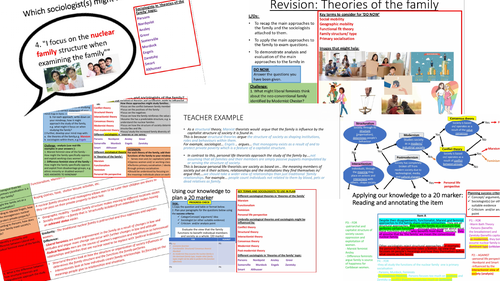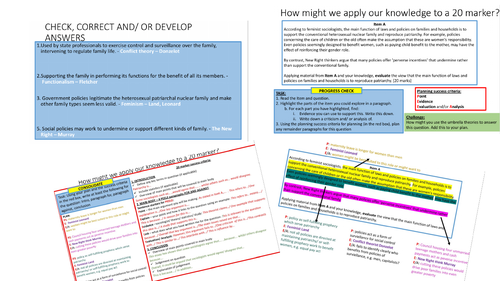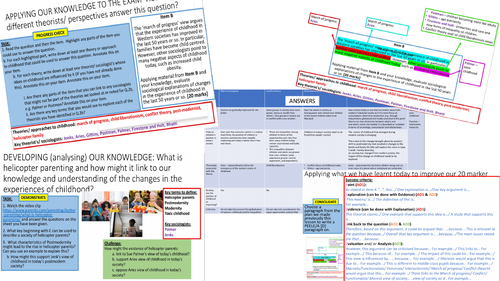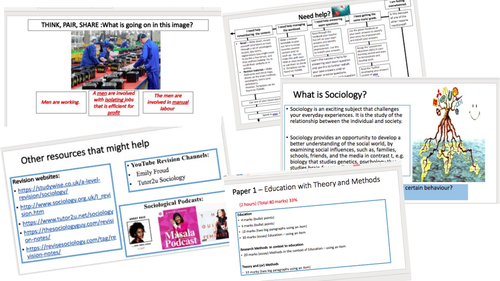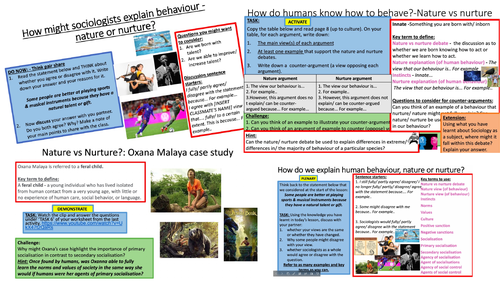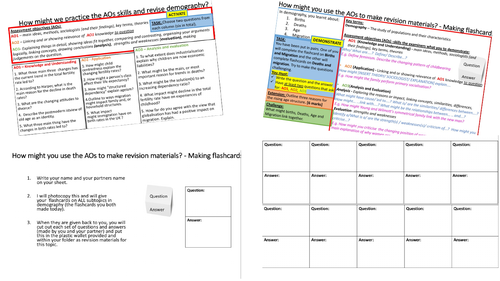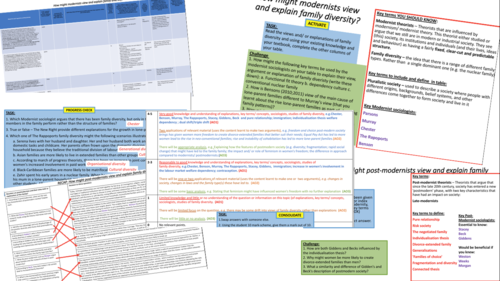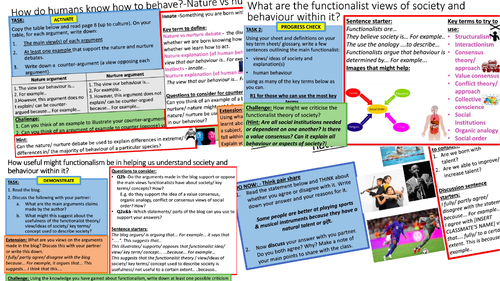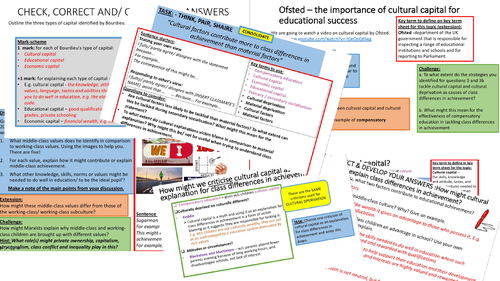
175Uploads
21k+Views
5k+Downloads
All resources

AQA A-level Sociology: Theories of the Family Revision lesson -How to further develop exam answers?
Detailed and differentiated (up and down), student led lesson that:
recaps the key sociologists students learn in this topic and what they say about the function(S) of the family.
recaps the main umbrella theories that students learn in year 12 (structuralism vs interactionism, modernism vs postmodernism and conflict vs consensus theories), how they view society and how this influences functionalist, marxist, feminist and personal life perspective approaches to the family.
how the knowledge above can be applied to exam questions to demonstrate both analysis and evaluation (AO3), e.g. by highlight the similarities and differences between the different theories of family or using knowledge of the umbrella theories to evaluate theories of the family.
supports students with planning a 20 marker on theories of the family using the item.
**RESOURCES CAN BE FOUND AT THE END OF THE PPT.
***
**ANSWERS FOR MOST OF THE ACTIVITIES CAN BE FOUND ON NEXT SLIDE AFTER ACTIVITY SLIDE
**
INCLUDES ORACY ACTIVITY

GCSE Sociology – Introduction to Marxism
explores capitalism, profit, social class, ownership, interests, structuralism, conflict theories, exploitation, false consciousness and social relations of production as a way to introduce students to the main Marxist views and ideas.
Includes answers for main activities
Resources can be found at the end of the PPT.
Made to meet the AQA spec but can be used (and edited if needed) for other exam boards
Bundle

A-LEVEL SOCIOLOGY INTRO LESSONS - nature vs nurture, functionalism, marxism, feminism, QUIZ & ANSWERS
Detailed and differentiated (up and down) student-led lessons that help students to develop their knowledge and understanding from previous lesson(s). L2 uses page 8 from AQA Book 1 by townsend but CAN BE USED FOR ANY SPEC using resources within lesson (see below). Comes with key term sheet for the lesson.
1. Introduction to Sociology - provides an overview of Sociology course (spec to AQA A-level but can easily be edited to suit ANY SPEC and GCSE) and the sociological imagination.
2. How do sociologists explain behaviour? -Nature vs Nurture lesson -explores the nature vs debate, norms, values, socialisation (primary/secondary) and social control as an introduction to Sociology. Uses page 8 of the AQA A-level Book 1 by Townsend to introduces students to the nature vs nurture debate but this can be replaced and the rest of the lesson can still be used.
3. Introduction to functionalism -explores value consensus, social order, biological/ organic analogy, structuralism, consensus theories to introduce students to the key functionalist views and ideas.
4. Introduction to Marxism -explores capitalism, ownership, interests, structuralism, conflict theories, exploitation as a way to introduce students to the main Marxist views and ideas.
5. Introduction to feminism - explores sex, gender, gender roles, patriarchy, socialisation, gender inequality as a way to introduce students to the main feminist views of society and ideas.
6. Quiz lesson - small revision activity
25 min quiz (on nature vs nurture, key functionalist, Marxist, feminist’s ideas and terminology) —LESSONS CAN BE FOUND ON MAIN PAGE. Includes:
answers/ mark-scheme
scaffolding for students to peer assess (but quiz can also be marked by teacher)
Made for AQA but can be used for ANY SPEC
Can be differentiated down for GCSE, but I recommend purchasing the GCSE Intro lessons bundle which have alread been edited to meet the needs of KS4 students.

AQA A-Level Sociology Education PLC (EDITABLE)
Personal Learning Checklist for the education unit in the the AQA A-level Sociology syllabus.

AQA A-level Sociology: Families Topic 7 ‘Families and Social policy’ Revision lesson
Detailed and differentiated (up and down) student led lesson that:
briefly recaps the main theories (Feminism, The New Right, Conflict theory, Functionalism) and theorists (Donzelot,Murray, Fletcher, Land & Leonard) and their views on the function of social policies and the relationship between families and social policies and.
models and supports students in using this knowledge to plan (using a planning success criteria) and answer (using a paragraph success criteria) a 20 marker USING THE ITEM.
RESOURCES CAN BE FOUND AT THE END OF THE PPT.
**ANSWERS FOR MAIN ACTIVITIES CAN BE FOUND ON NEXT SLIDE AFTER ACTIVITY SLIDE
**

AQA A-level Sociology: How to further develop exam answers using the AOs? - Couples Revision
Detailed and differentiated (up and down), student led lesson that teaches exam skills and recaps ‘Couples’ content of AQA specification; recaps the main sociologists and themes in the ‘Family’ unit, Topic 1 – Couples WHILST teaching students how to use the Assessment Objectives (AOs) -AO1, AO2, AO3- to further develop their answers using MODEL ANSWERS and examples.
NOTE – Students will need to have gone over or have a basic understanding of using a set success criteria or writing format for their paragraphs TO BE ABLE TO GAIN THE MOST OF OUT THIS LESSON – this lesson using set success criteria PEELE/A (for 20 markers) and PERD (for 10 markers).
**RESOURCES CAN BE FOUND AT THE END OF THE PPT.
**
**ANSWERS FOR MOST OF THE ACTIVITIES CAN BE FOUND ON NEXT SLIDE AFTER ACTIVITY SLIDE
**

AQA GCSE Sociology- Research methods-Official and non-official statistics
Detailed lesson with lots of scaffolding based on adaptive teaching that help students understand the difference between official and non-official statistics, the advantages and disadvantages of using official and non-official statistics to investigate sociological issues or topics.
Key terms included: Official statistics, non- official statistics
Key terms and studies you should know what link: The Millenium Cohort Study (MCS)– The British Cohort Study (BCS) - Secondary vs primary methods and data – Data - Quantitative vs qualitative data
Answers to main activities included
includes key term and definition sheet for the lesson
Resources can be found at the end of the PPT

AQA GCSE Sociology - Research Methods: What PET issues might sociologists consider for research?
Detailed lesson with lots of scaffolding based on adaptive teaching that help students understand what are PET issues that sociologists consider when designing and conducting research (e.g. define and identify possible practical, ethical and theoretical (PET) advantages and disadvantages of social research and explaining PET’s differences
Covers the following key terms: Practical issue, Ethical issues, Theoretical issues,Anonymity, Confidentiality , Informed consent, Covert research (extension), Pseudonym (extension), Mixed method (extension) Findings (of research) (extension).
Key bodies, laws and theories we will cover: British Sociological Association, Data Protection Act 1998, Positivism, Interpretivism
Answers to most main activities are included
Resources can be found at the end of the PPT

AQA GCSE Sociology: Research Methods- Longitudinal studies
Detailed lesson with lots of scaffolding based on adaptive teaching that help students understand longitudinal studies.
Cover the following key terms: longitudinal study, cohort, cross-sectional study
Covers the following sociologists: the UP series, The Millennium Cohort study
Makes references to key terms students should know- CHECK IF THIS IS THE CASE - Promotes a spiral curriculum by making links to key terms that students might have previously been taught that link to this lesson.
RESOURCES CAN BE FOUND AT THE END OF PPT
NO starter activity included
ANSWERS TO MOST ACTIVITIES INCLUDED
Includes student-friendly mark scheme for a 4 and 2 markers
Includes model answer for 4 marker
Teaches students how to answer 2 marker using an item
Includes so model 2 mark answers and answers that would not be awarded 2/2.

AQA A-level Sociology: Media- Media representations of disability
Detailed lesson with lots of scaffolding based on adaptive teaching that help students understand media representations of disability.
Covers the following key terms: disability, impairment, pitiable or pathetic, object of curiosity/ element of atmosphere, sinister or evil media stereotypes, super cripple, laughable/object of ridicule, own worst enemy, a burden, non-sexual, unable to participate in daily life.
Covers the following sociologists: Shakespeare, disability discrimination act, cumberbatch, broadcasting standards comission, brian et al, philo et al, time to change, barnes, cumberbatch and negrine.
Starter activity provides the opportunity for students to recap and be tested on what they should have leant so far in the media representations topic, e.g. media representations of children, symbolic annihilation, explanations of gender stereotyping in the media.
Requires information in textbook - 'SOCIOLOGY For AQA Volume 2 by Browne, Blundell & Law
Includes a discussion activity with sentence starters and prompts to promote oracy.
Includes a 10 marker with detailed scaffolding to help students answer it as well as a student friendly mark-scheme for peer and self assessment
ANSWERS TO SOME ACTIVITIES INCLUDED
Activities require pages from the AQA A Level Sociology Book One Including AS Level: Book one 3rd Revised edition by Rob Webb, Hal Westergaard, Keith Trobe, Annie Townend

AQA A-level Sociology: Families Topic 2 ‘Childhood’ Revision lesson
Detailed and differentiated (up and down) student led lesson that supports students in recapping the main theories, views and explanations of the position of childhood; examines how march of progress, conflict, child liberationists and postmodernist theories’ view society and how this might influence their approach or view of childhood and its changes over time. Also highlights the key sociologists (Katz, Postman, Aries, Palmer, Jenks, Gittens) in this topic.
The lesson then requires students to apply this knowledge to plan (using a success criteria) a 20 marker and write at least one paragraph for it.
RESOURCES CAN BE FOUND AT THE END OF THE PPT.
MODEL PLAN AND ANSWERS FOR MAIN ACTIVITY CAN BE FOUND ON NEXT SLIDE AFTER ACTIVITY SLIDE

Introduction to Sociology lesson
This is a lesson I use as an introduction to the AQA A-level Sociology course and to the sociological imagination or line of inquiry. The lesson includes:
an overview of the course, exam and curriculum
activities to introduce students to Sociology and sociological thinking/ inquiry.
suggested reading, podcasts, revision websites youtube channels that students can use to develop their knowledge and understanding of key ideas and concepts.
Expectations
Can be easily edited to meet your needs, e.g. specification, expectations and can also be used as an introduction to AQA GCSE Sociology .

GCSE Sociology – Introduction to Feminism
explores sex, gender, gender roles, patriarchy, gender inequality as a way to introduce students to the main feminist views of society and ideas.
Includes answers for main activities
3 marker with a success criteria and student friendly mark-scheme
Resources can be found at the end of the PPT (worksheet is in folder).**
Made to meet the AQA spec but can be used (and edited if needed) for other exam boards

Nature vs nurture - How might we explain behaviour?
Detailed student-led lesson that explores the nature vs debate, norms, values, socialisation (primary/secondary) and social control as an introduction to Sociology. Uses page 8 of the AQA A-level Book 1 by Townsend to introduces students to the nature vs nurture debate but this can be replaced and the rest of the lesson can still be used. Comes with worksheet used for two of the activities and key term sheet for the lesson. Can be used for both GCSE and A-level.

AQA A-level Sociology: Families Topic 4 ‘Demography’ Revision lesson
Detailed and differentiated (up and down), student led lesson created to help students recap key ideas examined in the demography topic of the family unit, make revision materials based on this content and be able to apply this knowledge to exam questions, particularly 10 markers that makes links between topics - This lesson is very helpful for developing the skills students need for to answer ‘Outline and explain’ 10 markers which requires students to demonstrate the ability to connect two elements, aspects, subtopics, or topics to answer the question.
Lesson also recaps the assesment objectives (but can be used to introduce students to the assessment objectives) (AOs – AO1, AO2 & AO3). The lesson requires students to answers questions based on each AO and then provides guidance and support for students to use the AOs to make flashcards (with questions and answers).
**RESOURCES CAN BE FOUND AT THE END OF THE PPT.
**

AQA A-level Sociology: Families Topic 6 ‘Family diversity’ Revision lesson
Detailed and differentiated (up and down) student led lesson that aims to recap and consolidate student’s knowledge and understanding of:
key sociologists (Parsons, Murray, Chester and Benson, Stacey, Beck, Giddens and more)
key terms (Rapoports’ different types of diversity, neo-conventional Pure relationship, Risk society, negotiated family, individualisation thesis, Divorce-extended family, 'Families of choice’, Fragmentation and diversity, Connected thesis and more) in the family diversity topic of the family unit.
the main difference in modernist and postmodernist views of: society, the family AND explanations of family diversity.
INCLUDES STUDENT FRIENDLY MARK-SCHEME FOR 10 MARKER ON THIS TOPIC
RESOURCES CAN BE FOUND AT THE END OF THE PPT.
ANSWERS FOR MOST ACTIVITIES (Recap and planning activity) INCLUDED AND CAN BE FOUND ON NEXT SLIDE AFTER ACTIVITY SLIDE
INCLUDES ORACY ACTIVITY

Introduction to functionalism
Detailed and differentiated student-led lesson that explores value consensus, social order, biological/ organic analogy, structuralism, consensus theories as a way to introduce students to the main functionalist views and ideas. Can be used for ANY SPEC. Catered towards A-level students but can easily be simplified and/ or for younger students. Comes with key term sheet for the lesson.

AQA A-Level Sociology Families and Households PLC (EDITABLE)
Personal Learning Checklist for the Families and Households unit in the the AQA A-level Sociology syllabus. PLC includes topic and page numbers from the Westergaard and Townsend book one for content students my find hard to locate.

A-level Sociology: Introduction to Marxism
Detailed and differentiated student-led lesson that explores capitalism, ownership, interests, structuralism, conflict theories, exploitation as a way to introduce students to the main Marxist views and ideas. Can be used for ANY SPEC. Catered towards A-level students but can easily be simplified and/ or cut down for younger students. Comes with key term sheet.

Sociology Education Class differences in achievement - Cultural capital
Detailed and differentiated (up and down), student led lesson that explores cultural, educational and economic capital and compensatory education to enable students to understand the role of cultural capital in causing class differences in achievement/ middle-class achievement. Also covers and supports students in answering 4/6 markers using a success criteria and student-friendly mark-schemes.
ANSWERS TO MAIN ACTIVITIES AND EXAM QUESTIONS ARE INCLUDED
COMES WITH FREE A-LEVEL HELP SHEET AND KEY TERM SHEET FOR TOPIC 1 & 2
**Made for AQA A-level but can be easily used for other specs (just need a different source of information/ textbook) differentiated down for GCSE) lesson **
Uses and refers to ’ AQA A Level Sociology Book One Including AS Level: Book one 3rd Revised edition by Rob Webb, Hal Westergaard, Keith Trobe, Annie Townend ’ textbook

